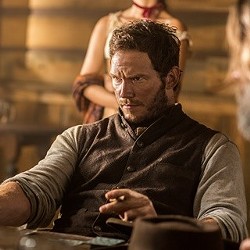THE MAGNIFICENT SEVEN
**1/2
The 1960 Western classic The Magnificent Seven (itself an Americanized version of Akira Kurosawa’s 1954 Seven Samurai) found its septet of gunslingers pooling their resources to protect the residents of a small village against the boastful, greedy and downright evil Mexican bandit Calvera, even going so far as to build a wall around the town perimeters.
The new version of The Magnificent Seven plays out as a straightforward oater with plenty of colorful characters and even more colorful action. We all periodically need a rousing action flick to stir our senses, and this handsomely mounted production offers sporadic thrills. It’s just a shame the overall film isn’t better.
In this take, the villain is Bartholomew Bogue (Peter Sarsgaard), who wants to take over the town of Rose Creek and has his army of underlings gun down men and women alike to prove he’s serious. Townsperson Emma Cullen (Haley Bennett), whose husband is murdered by Bogue himself, takes it upon herself to search for men who can help them in the battle against Bogue.
She first locates Sam Chisolm (Denzel Washington), a state-sanctioned bounty hunter, and he in turns recruits the other six: Josh Faraday (Chris Pratt), quick with the cards and the wisecracks; Goodnight Robicheaux (Ethan Hawke), a former Confederate officer who has lost his nerve; Billy Rocks (Byung-hun Lee), Goodnight’s companion; Jack Horne (Vincent D’Onofrio), an eccentric scout; Vasquez (Manuel Garcia-Rulfo), a Mexican outlaw; and Red Harvest (Martin Sensmeier), a Comanche warrior.
Even with the knowledge that it’s basically a suicide mission, they all agree to take part, whether for money, glory or something else entirely.
Director Antoine Fuqua and scripters Richard Wenk and Nic Pizzolatto don’t just offer carbon copies of the seven from the previous picture — while there are elements of, for example, Yul Brynner’s Chris in Washington’s Chisolm and Steve McQueen’s Vin in Pratt’s Faraday, these are for the most part new characters created for a new film.
While it’s admirable that the filmmakers forged their own path, it’s also lamentable in that, overall, these men aren’t nearly as interesting or as memorable as the 1960 models. Hawke’s intensity keeps Goodnight watchable, but Pratt’s patented shenanigans are less entertaining than usual, and while Washington only has to walk in front of the camera lens to project strength and charisma, his Sam Chisolm is on the stiff side, not nearly as engrossing as the taciturn heroes he essayed in, say, The Book of Eli or his last picture, 2014’s The Equalizer (also directed by Fuqua and written by Wenk).
As for Sarsgaard, it’s disheartening to see this fine actor saddled with such a ridiculous role, a one-note villain who almost makes Hannibal Lecter look like Mahatma Gandhi. The action scenes are well-staged if deeply impersonal — in fact, much of the film feels rote and mechanical, less a vibrant throwback to vintage Westerns and more a marketing campaign in search of meaning.
In the 1960 version, the survivors ride off into the sunset; in this new take, we only see actors riding off in search of the next gig.


